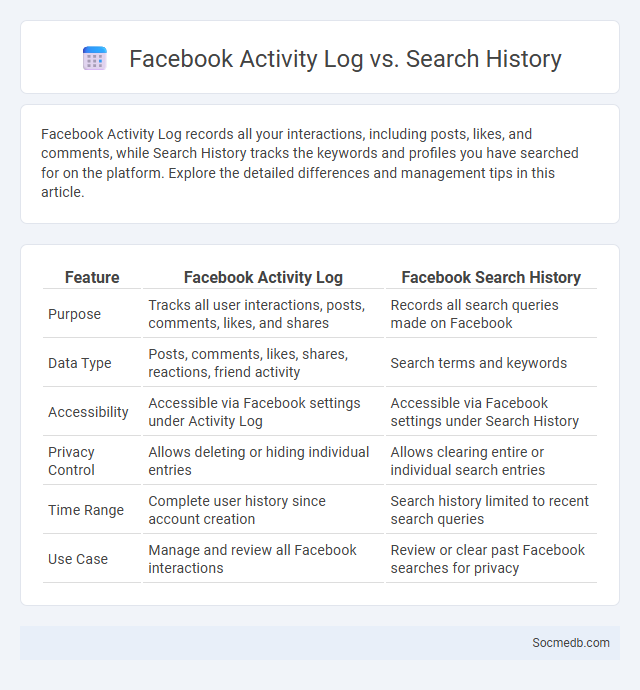
Photo illustration: Facebook Activity Log vs Search History
Facebook Activity Log records all your interactions, including posts, likes, and comments, while Search History tracks the keywords and profiles you have searched for on the platform. Explore the detailed differences and management tips in this article.
Table of Comparison
| Feature | Facebook Activity Log | Facebook Search History |
|---|---|---|
| Purpose | Tracks all user interactions, posts, comments, likes, and shares | Records all search queries made on Facebook |
| Data Type | Posts, comments, likes, shares, reactions, friend activity | Search terms and keywords |
| Accessibility | Accessible via Facebook settings under Activity Log | Accessible via Facebook settings under Search History |
| Privacy Control | Allows deleting or hiding individual entries | Allows clearing entire or individual search entries |
| Time Range | Complete user history since account creation | Search history limited to recent search queries |
| Use Case | Manage and review all Facebook interactions | Review or clear past Facebook searches for privacy |
Introduction to Facebook Activity Tracking
Facebook activity tracking collects user interactions such as likes, shares, comments, and browsing behavior across the platform and partner websites. This data enables personalized advertising, content recommendations, and performance analytics, enhancing user engagement and business targeting accuracy. Privacy controls and transparency settings allow users to manage the information collected and its use in advertising.
What is Facebook Activity Log?
Facebook Activity Log is a comprehensive tool that allows users to view and manage all their interactions on the platform, including posts, comments, likes, and search history. It provides detailed records of activities in chronological order, enabling users to review and delete specific actions to control their privacy and content visibility. This feature is essential for maintaining digital hygiene and customizing personal data exposure on Facebook.
Understanding Facebook Search History
Facebook search history records all user queries made within the platform, allowing for quick access to previously searched profiles, pages, and content. This data is stored in the activity log and can be reviewed or deleted through the settings to protect user privacy and manage personalized recommendations. Understanding Facebook search history helps users control their digital footprint and enhances the relevance of future search results.
Differences Between Activity Log and Search History
The Activity Log on social media tracks all your interactions, including likes, comments, and posts, providing a comprehensive timeline of your engagement. Search History specifically records your past search queries, helping you quickly revisit previous searches but without showing your interactions or content views. Understanding these differences helps you manage your digital footprint and privacy settings more effectively.
How to Access Your Facebook Activity Log
Access your Facebook Activity Log by logging into your account and clicking on your profile picture to open the menu. From there, select "Settings & Privacy," then choose "Activity Log" to review your posts, reactions, and comments. Your Activity Log provides a comprehensive overview of your Facebook interactions, enabling you to manage and control your digital footprint effectively.
Managing and Deleting Search History on Facebook
Managing and deleting your search history on Facebook enhances your privacy by removing past queries from your account activity. You can access your search history by navigating to the Activity Log under Facebook settings, where you have the option to delete individual search entries or clear the entire search history at once. Regularly maintaining this data helps control the information Facebook uses to personalize your experience and protect your digital footprint.
Privacy Implications of Activity Log and Search History
Social media activity logs and search histories store vast amounts of personal data, making them prime targets for privacy breaches and unauthorized profiling. Your interactions and searches can be tracked, analyzed, and monetized by platforms, potentially exposing sensitive information to advertisers or third parties without explicit consent. Understanding how these logs affect your digital footprint empowers you to manage privacy settings and control data sharing effectively.
Tips for Reviewing Your Facebook Digital Footprint
Regularly audit your Facebook privacy settings to control who can see your posts and personal information. Use Facebook's Activity Log to review, manage, and delete past posts, comments, and likes that no longer represent your current views. Consider searching your name on Facebook to identify and adjust any content associated with your profile for a cleaner and more professional digital footprint.
Pros and Cons of Facebook’s Tracking Features
Facebook's tracking features enable highly targeted advertising by collecting extensive user data, resulting in increased ad relevance and improved business ROI. However, these features raise significant privacy concerns, as users often remain unaware of the extent of data collection and risk exposure to unauthorized data access. Balancing effective ad targeting with stringent privacy protections remains a crucial challenge for Facebook and its users.
Best Practices for Protecting Your Facebook Privacy
To safeguard your Facebook privacy, regularly review and customize your privacy settings to control who can see your posts, profile information, and friend list. Enable two-factor authentication to add an extra layer of security and monitor active sessions to log out of unrecognized devices. Avoid sharing sensitive personal details and be cautious when clicking on third-party app permissions to protect Your data from unauthorized access.
 socmedb.com
socmedb.com